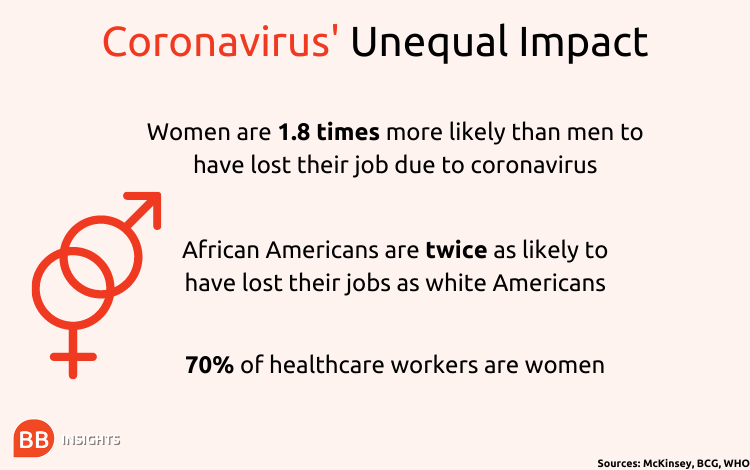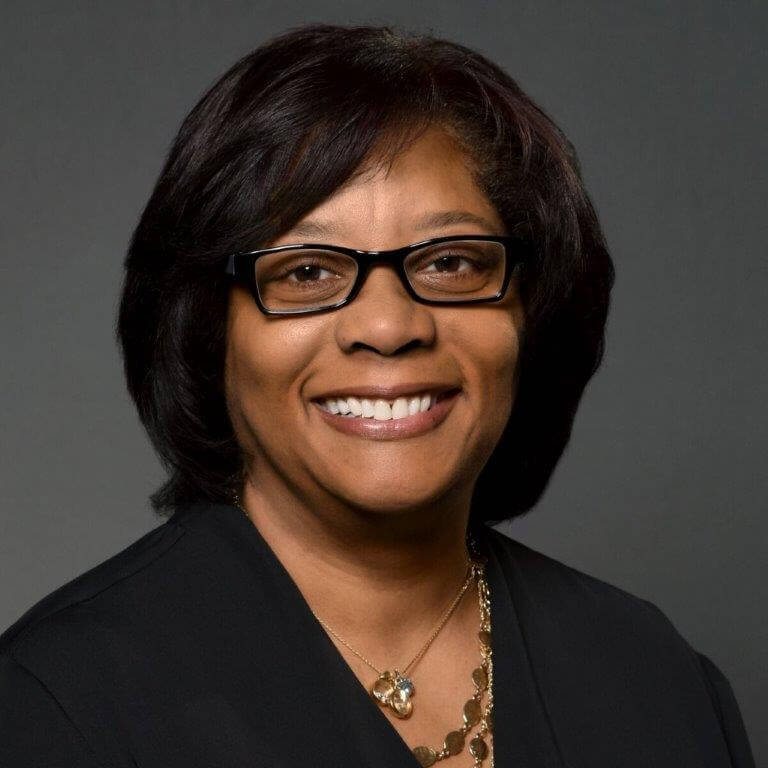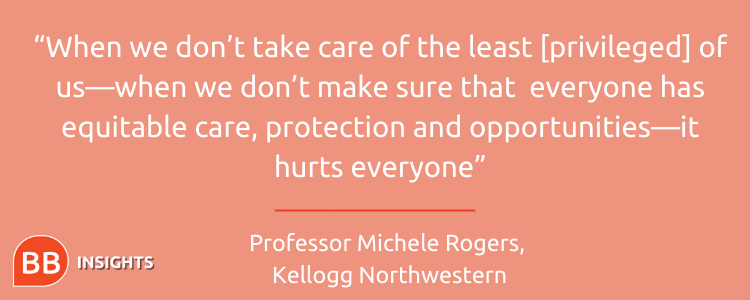In the US, Black Americans are three times more likely to die from coronavirus than whites. The Black community—and especially Black women—are also being hit hard economically.
A McKinsey study found that women’s jobs have been almost twice as vulnerable as men’s throughout the crisis, while a BCG report revealed that Black people in the US are twice as likely as white people to have lost their jobs.
“It’s layer upon layer of inequity,” comments professor Kellie McElhaney, founding director of the Center for Equity, Gender, and Leadership at Berkeley University’s Haas School of Business.
So why is the virus having such a disproportionately negative impact on Black women compared to the rest of the US?
Why the pandemic has deeply impacted Black women in the US
The impact of coronavirus on Black women in America has been especially bleak.
Their poor health outcomes have been exacerbated not only by the stress of systemic racism. Kellie explains that the nature of the jobs they tend to work—frontline roles in hospitality, retail, and healthcare—employ high rates of Black women. These are the industries hit hardest by coronavirus.
Many of these positions are also low paid and do not usually offer paid sick leave. In the US there is a striking racial wage gap between the median wage earned by Black women and white, non-hispanic men.
In the US today, women make just 82 cents for every dollar a man makes, and the discrepancy is even more pronounced when race is accounted for. For every dollar a white man earns, Black women make just 62 cents.

A lower wage means less money to save and less to support a family during a time of crisis. It makes Black women more vulnerable to economic shocks like job loss or furlough. Workers can also face the impossible choice between risking their health and that of others or forgoing their paycheck.
“It’s a recipe for incredible stress, if not infection and even death,” says Dr Michele Rogers (right), clinical assistant professor at Northwestern University’s Kellogg School of Management.
Michele’s experience in diversity consulting has given her some crucial insights into how and why Black women in the US are experiencing such disproportionate economic hardship in the face of coronavirus.
“That wage gap cascades over everything else—it rolls like thunder across every aspect of Black women’s lives.”
Then there’s the failure of government support for black-owned businesses. The US Paycheck Protection Program (PPP), which offers loans to help small businesses support their staff during the pandemic, often excluded Black and female-owned businesses in its first incarnation.
These funds were distributed through large banks, who prioritized firms they had worked with before. Black-owned businesses are twice as likely to be rejected for loans in the US. Few were given emergency funding at the outbreak of the pandemic.
How to promote a fair recovery from coronavirus
There is no single solution to ensure an equitable recovery, but small steps today can help mitigate these unfair outcomes.
In the short term, Michele recommends a more consistent approach to safety that would protect frontline workers. This includes the provision of PPE.
“There should be some basic government-backed guidelines to provide a safe working environment, and recourse for employees when these guidelines are not being met,” she says.
Ensuring all workers have access to paid sick leave is another important change that will support Black women through coronavirus, says Kellie. This would ensure that no one has to risk spreading the virus when they cannot afford to forgo a paycheck.

Individual companies can also examine what they are doing to support Black people and women—ensuring they are given equal hiring and promotion opportunities. Consumers can also proactively buy from Black and female-owned businesses.
It will take broader systemic change to prevent future crises like coronavirus hurting one group disproportionately.
Kellie believes that greater representation for workers on company boards is an important starting point. By inviting frontline workers to share their views—or even sit on the board—leadership can better understand the issues that workers face, and act to tackle them. Since frontline workers are often Black and female, direct representation would be a start.
“Corporate leadership has gotten so far away from understanding the day-to-day existence of the worker,” Kellie comments. “The best thing they can do is get more in touch with the worker experience in their company.”
The importance of political change
In the US, a change in political leadership will be equally crucial to ensure racial and gender equality is considered and prioritized during coronavirus recovery.
Since the election of Donald Trump the US has witnessed an increase in racially motivated hate crime. The Trump administration itself has also attempted to block equal pay laws, and roll back women’s reproductive rights.
“We need political change, and we need to get Americans out to vote,” says Kellie (right). “Things aren’t going to change if we have the same president.”
 During the last US election in 2016, Black voter turnout dropped for the first time since 1996. To encourage better turnout in 2020, Kellie recommends that companies designate election day as a holiday. Many organizations—from Coca-Cola to Unilever—have already taken this step.
During the last US election in 2016, Black voter turnout dropped for the first time since 1996. To encourage better turnout in 2020, Kellie recommends that companies designate election day as a holiday. Many organizations—from Coca-Cola to Unilever—have already taken this step.
“It’s these systemic policy changes that are going to really make a difference, so that when a crisis happens, one group doesn’t bear more of the burden than they should,” adds Michele.
The disproportionate impact that coronavirus has had on Black women has thrown into sharp focus the social and economic inequalities that persist in America today. Only when these inequities are dismantled will an equitable crisis response be possible.
“When we don’t take care of the least [privileged] of us—when we don’t make sure that everyone has equitable care, protection and opportunities—it hurts everyone,” Michele concludes.
Read next: Can Business Schools Do More To Support The Black Community?
BB Insights explores the latest research and trends from the business school classroom, drawing on the expertise of world-leading professors to inspire and inform current and future leaders


